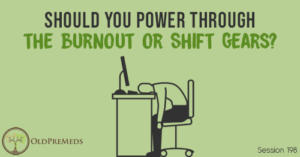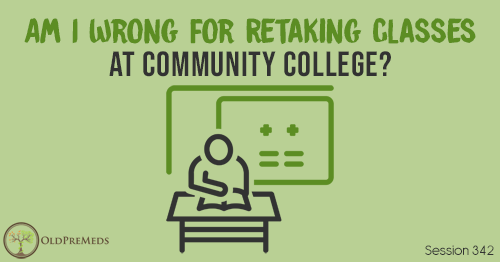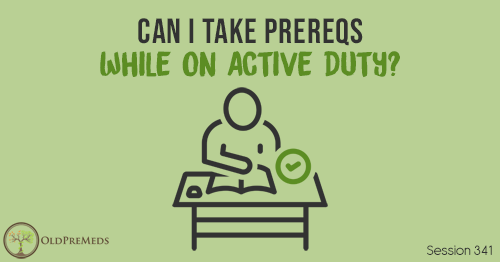Apple Podcasts | Google Podcasts

Session 198
Our med school hopeful is burnt out after tons of clinical work. As they continue to take courses, is it ok to switch gears and find work in research instead?
Your questions answered here are taken directly from the Nontrad Premed Forum. And if you haven’t yet, please sign up for an account and ask away!
Listen to this podcast episode with the player above, or keep reading for the highlights and takeaway points.
[00:57] OldPreMeds Question of the Week
“I have been a CNA since 2013, worked plenty of overtime, and probably have 8000 ish hours of experience doing this job. I am burnt out.
With my current stats (2.83 overall and 2.7 BCPM GPAs) I still have a couple years worth of coursework to bring my stats above 3.0 (and closer to 3.5s as long as I maintain 4.0s) and to complete a MS in Biomedical Sciences.
I really want to move into a research position for the next couple of years at the university I am attending because I think I can make much more significant contributions as a research assistant than a CNA at this point in time and having weekends to study would be amazing. (Right now to keep my health insurance I work Saturday, Sunday, and a night shift during the week so I can go to classes M-F).
Would it look bad to admissions committees if I shift from a primarily clinical job to a research role for the next couple of years?
I don’t want to hinder my chances of an acceptance because I didn’t just stick it out for the next two years at the hospital where I currently work. I know in the long run I want to return to this hospital as a physician and continue to serve this wonderful community.”
[02:25] CNA as Clinical Experience
This student has a ton of clinical experience as a CNA. But you don’t have to have a CNA to get clinical experience. So you can definitely switch into a research role and continue to get clinical experience in a different way.
'Maintain consistency with your clinical experience so that you're not just stopping cold turkey.'Click To TweetEspecially that you’re at the point of burnout right now, then you have to look at doing that. But why are the grades so low? Did you start off really poorly? Or are you continuing to do poorly because you were burnt out? Were you burnt out because you were working as a CNA to get things done?
[Related episode: Is Monitoring Telemetry Clinical Experience?]
[03:30] Upward Trend is Important
Make sure that you figure out your grades right now. Before you make another decision, make sure you’ve figured out your grades. Do not register for another class or any major.
Do not register for another degree without figuring out your grades, your study habits, and your academic abilities so that you can make sure you do get that 4.0 moving forward.
'A year or two of really strong, positive, upward trend will help out.'Click To Tweet[04:15] Master’s Degree
You don’t need a master’s in biomedical sciences as a master’s degree is a separate GPA calculation on AMCAS and AACOMAS. There is a combined overall GPA on AACOMAS and some schools may calculate a combined GPA. But several schools give preference to undergraduate GPAs.
'A master's degree for most students is a waste of time and a waste of money to help you get into medical school.'Click To TweetBut if you want to do an MPH because you really like it and you want to integrate it into your practice in the future then go ahead. However, if you’re only doing it to improve your chances of getting into medical school, think twice.
[05:22] Clinical Consistency is Key
If you decide to stop working as a CNA to do research, this is not a red flag. It just means you’ve found a different passion. You found something that will work with your schedule better to improve your grades.
So don’t think of it in terms of medical schools being concerned that you’re stopping your clinical work. Maybe pick up a per diem shift as a CNA or as a hospice volunteer doing something that will give you some clinical experience.
'Maintaining some sort of clinical consistency is going to be important.'Click To Tweet










